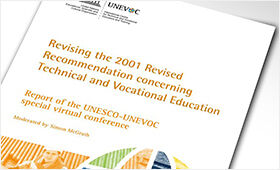UNESCO revised Recommendation concerning TVET
Normative instrument on vocational education and training undergoes update
04.04.2016
Fifteen years after the last revision, the United Nations Educational, Scientific and Cultural Organization (UNESCO) released an overhaul of its “2001 Revised Recommendation concerning Technical and Vocational Education”. As a partner institute of the United Nations International Centre for Technical and Vocational Education and Training (UNESCO-UNEVOC) and member of the worldwide UNEVOC network, the Federal Institute for Vocational Education and Training (BIBB) played an active role in the revision process. BIBB Vice President and Director of Research Prof. Dr. Reinhold Weiß and Birgit Thomann, head of the international department, were both convened as experts on technical and vocational education and training.

According to the UNESCO’s general principles, technical vocational education and training (TVET) is part of both the universal right to education and the right to work. In this respect, TVET is understood as contributing toward the promotion of understanding and respect for human rights; inclusion and social equity; gender equality and cultural diversity. Furthermore, TVET plays a role in fostering lifelong learning and a sense of community thus contributing to social and economic participation and to the realisation of lasting peace, responsible citizenship, and sustainable development.
UNESCO-UNEVOC The BIBB has been an active member of the International Centre for Technical and Vocational Education and Training (UNEVOC network) since 1994. The BIBB is involved here in the development of a “Greening TVET Framework” as part of the project entitled “Strengthening National Capacities for Improving TVET Systems, Policies and Practices in Advancing Green Society and Economy”, and is also involved in the development of the UNEVOC knowledge management system. In addition to this, the BIBB also provides papers for conferences and network meetings. From 2016, the BIBB will be working on a joint research project on the theme of “Work-based learning”.
The revision process
It is the UNESCO’s task to monitor and implement the two normative instruments that exist in the field of TVET, the “1989 Convention on Technical and Vocational Education” and the “2001 Revised Recommendation concerning Technical and Vocational Education”. As previously defined, an independent study on the impact of those instruments was conducted in 2011 recommending a revision due to new demands and changes that developed over the last decade. 210 participants from 70 different countries, including representatives of the member states, and other relevant actors in TVET from regional and international organisations, as well as national legal and technical experts participated in a Special Virtual Conference organised by UNESCO-UNEVOC in April 2014.
Taking into consideration the diverse input, a revised draft text was compiled and handed over for feedback to a newly established expert group on TVET. The expert group comprised representatives from the UNEVOC network, the ILO and international social partners. The BIBB was represented in this advisory body by Vice President Prof. Dr. Reinhold Weiß and Department Head Birgit Thomann. The expert group on TVET, together with an expert group on Adult Learning and Education met in Hamburg in May 2014 to discuss and adopt a first draft.
Between July 2014 and June 2015 the UNESCO consulted its member states in a two-stage procedure. Opinions, comments and suggested amendments on the first draft were considered in a second draft and sent out to the member states for a second review.
On 13 November 2015, the 38. UNESCO General Conference unanimously adopted the revised recommendation concerning TVET. The official launch of the revised recommendation took place on 4 April 2016 in Paris.
What’s new?
In the overhauled version, a great emphasis was placed on the following points:
- The integrated approach to education and training and holistic view of both dimensions, ensuring that TVET promotes a broad spectrum of knowledge, skills and competencies for work and life;
- The attention given to work-based learning and capture of informal TVET;
- The focus on the involvement and participation of stakeholders, with establishment of public-private partnerships and the promotion of social dialogue;
- The integrated approach in the development of TVET policies and inter-ministerial coordination.
In detail, the recommendation covers five thematic fields: Policies and governance, quality and relevance, monitoring and evaluation, research and knowledge management, as well as international cooperation.
In terms of polices and governance, member states are asked to develop policies and implement governing structures and regulatory frameworks that promote TVET and support its management and financing. In this process, participation of other stakeholders, of public and private actors, as well as social partners is encouraged. Furthermore the political framework must guarantee equal and non-discriminatory access to TVET for all members of society.
Quality and relevance are assured by providing for a variety of learning opportunities including work-based learning, informal learning, distance and online learning. These flexible learning approaches pose additional challenges to the professional development of TVET staff. Qualification frameworks or systems need to be implemented and systems for the recognition, validation and accreditation of skills acquired through non-formal learning need to be established. Quality assurance in TVET is as important as keeping in mind the relevance of the education system to labour markets and the world of work.
Once new policies and programmes are initiated, appropriate tools and indicators should be developed for monitoring and evaluating the efficiency of new TVET policies. In connection with the evaluation, research and knowledge management are equally important in order to further develop TVET policies.
Finally, member states are encouraged to make use of the international UNEVOC network in order to share knowledge and experience with partners all over the world.
According to Birgit Thomann the revision of the 2001 Revised Recommendation concerning Technical and Vocational Education will contribute to the quality of a vocational education and training being close to the needs of the world of work and well-grounded in reliable data and findings of research and development.